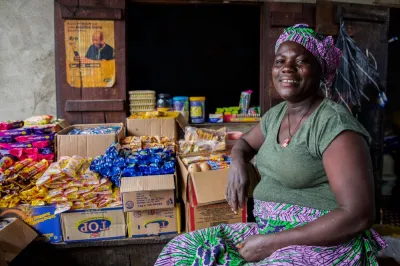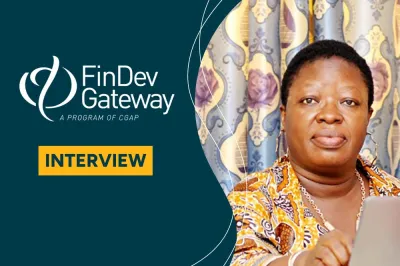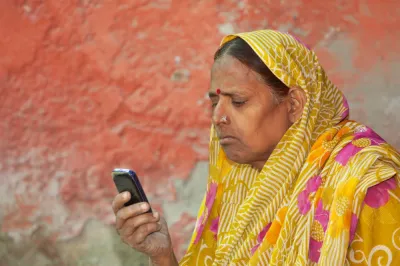COVID-19 FinDev Weekly Update | 01-07 May 2020
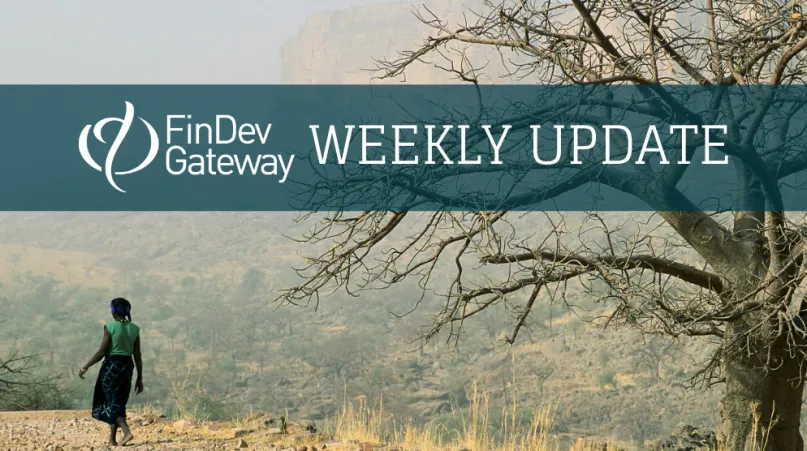
FinDev Gateway has created this COVID-19 weekly update with the latest and most relevant knowledge resources for financial inclusion as they become available. Sign up to receive FinDev's weekly update each Friday with a summary of the main issues covered during the week.
If you have content to share in our weekly update, please submit here or contact us directly.
Weekly Summary
- While the ongoing crisis may cause significant loss in physical capital, lenders must consider the human capital that small businesses have developed and will retain beyond the crisis, which can help them resume activities quickly, says Elisabeth Rhyne.
- As the drive to digitize continues, GSMA calls for lowering taxes on mobile money services. Alexandra Rizi of Smart Campaign warns that rushed and fear-based policies which push digitization may do more harm than good and can lead to a new kind of financial exclusion - given that over a billion people cannot read, and many cannot afford devices and data plans.
- Pay-as-you-go Solar (PAYGo Solar) drives the adoption of mobile money, according to a GSMA report. Globally, mobile money usage among PAYGo solar customers increased from 27 to 113 percent, with the usage extending beyond just solar payments. While PAYGo companies have long invested in building a culture of payment discipline among customers, the crisis may undermine those efforts.
- Financial Action Task Force (FATF) has identified a series of money laundering risks emerging as a result of the ongoing crisis, including a possible increase in the use of digital financial services to conceal illicit funds.
Asia
- In India, digital lenders are experiencing first ever slowdown as the country’s lockdown prevents them from collecting physical signatures required for the new loans. Digital lenders expect new regulations that would allow for e-KYC for non-banking finance companies.
- Small Industries Development Bank of India (SIDBI) has extended the repayment period of loans to non-banking finance companies and MFIs to one year from the initial 90-day period. And while the Indian government has extended the lockdown to 17 May, MFIs prepare to resume operations in areas designated as safe from the COVID-19 virus outbreak, after the government said it would lift certain restrictions.
- In Cambodia, which already had the world’s highest microloan debt per borrower, there are serious concerns about clients’ ability to pay back loans, and the possibility that many could end up landless due to the widespread practice of requiring land as collateral.
- In Myanmar, the suspension of microfinance operations was extended to 15 May as the Financial Regulatory Department found some MFIs did not follow the directive on loan repayments and had forced borrowers to repay loans.
Africa
Some articles and knowledge resources referenced in this section are in French.
- In Africa, 9 out of 10 enterprises are informal and at risk of closure, warns the International Labour Organization (ILO). The pandemic will increase poverty and vulnerability of 325 million informal workers on the continent.
- Côte d’Ivoire announced food aid to support women affected by the crisis. But, food aid alone may not be enough. UN Women Africa has urged governments to consider the gender aspect in their social protection measures and stimulus packages given that half of households in Southern Africa and the Sahel are headed by women who, in most cases, are the sole income earners.
- Threatened by the economic crisis, youth in West Africa are fighting back with innovation, from social impact apps to online marketplaces.
- From digital payments to renewable energy, the African tech has grown in the past five years. But, according to AfricArena, a startup accelerator, the pandemic could turn this into a sharp decline; funding for African startups could fall by $800 million.
For more on Africa, check out the latest Portail FinDev Weekly Update in French.
Latin America and the Caribbean
Most articles and knowledge resources referenced in this section are in Spanish.
- Most Latin American countries are taking their first steps to lift COVID-19 measures. Plans vary by country but range from resuming some economic activities - such as construction and the public sector - to the relaxation of mobility restriction.
- The International Labour Organization (ILO) estimated that the loss of work hours due to various lockdowns is equivalent to the disappearance of 31 million full-time jobs in the region. Similarly, the Economic Commission for Latin America and the Caribbean (ECLAC) estimates that nearly 38 million people will be out or work, pushing the regional unemployment rate from about 8 percent to over 11 percent this year.
- With unemployment on the rise, FAO warned that hunger will increase in a region that already has food security problems. Food policies adopted by governments vary; in the Caribbean and Mesoamerica, they are oriented towards self-production, while in South America governments focus on delivering food kits to the most vulnerable people and schoolchildren.
- Though cash is the preferred form of payment in the region, digital payments have risen during the crisis; financial service providers want to ensure that consumers and businesses continue to use digital payments after the crisis and are offering a range of incentives and benefits to users.
For more on LAC, check out the latest Portal FinDev Weekly Update in Spanish.
Arab World
- SANAD’s Technical Assistance Facility, a regional impact investment fund for MSMEs, has launched a COVID-19 Crisis Response Program which offers advice to partners in addressing the crisis effects on their operations.
- UNHCR and its partners have received over 350,000 calls from refugees and displaced people across the Arab World. The majority asked for urgent financial assistance to cover their daily basic needs.
- In Jordan, a rapid assessment by the International Labor Organization and Fafo Institute for Labor and Social Research found that 47 percent of surveyed vulnerable workers, including refugees, women and informal workers, have lost their jobs due to the pandemic.
- Lebanon’s government has turned to the IMF for a bailout; however, banks have rejected the government plan to restructure the banking sector. The country’s economic crisis, which predates the coronavirus pandemic, has seen the Lebanese pound lose over half of its value in six months, and depositors have been denied access to their savings, leading to riots during which one protester was killed.
For more on the Arab world and resources in Arabic, check out the latest FinDev Weekly Update in Arabic.
COVID-19 Resources
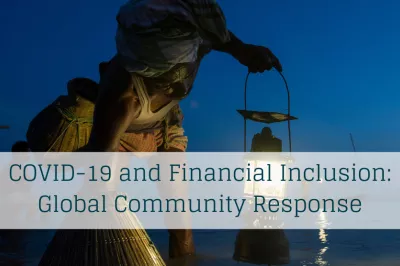
Global Community Response to COVID-19
A list of organizations offering resources and insights on COVID-19 & microfinance
FinDev Coronavirus Data Tracker
Data relevant for financial inclusion - find out who is tracking what
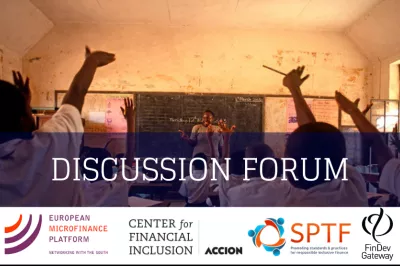
Discussion Forum
Forum for the financial inclusion sector to discuss responses to COVID-19
Blogs & Opinion
If you have a blog idea and would like to write for the FinDev Blog, please see our review our guidelines. We do not cross-post blogs that have been published elsewhere, but if you wish to share an existing blog post in our next FinDev Weekly Update, you can send it to us using our contact form.
Focus on Customers
Customer Engagement During COVID-19
A COVID Digitization Stampede Mustn’t Trample Consumer Protection
Sector Response
Keeping the Lights On: How PAYGo Solar Can Offer Customer Relief During COVID-19
Accountability for COVID-19 Aid: Better Visibility Matters for the Quality of the Response
Digital Finance and Fintech
Adjusting Mobile Tax Policy in Light of COVID-19: How Fiscal Policy Can Keep Us Connected
Is COVID-19 Pakistan’s Black Swan Event for Digital Payments?
"Brazilian Storm": Will Credit Fintechs Surf the COVID-19 Tsunami?
Recent Publications
For a complete list of publications and to learn how you can share your research with us, visit FinDev's Publications page.
COVID-19-Related Money Laundering and Terrorist Financing
This publication shares risks and policy responses developed in response to the unprecedented and rapidly evolving COVID-19 public health crisis.
Supervising Corporate Governance During Crises
This note considers the implications of the COVID-19 outbreak for the corporate governance of supervised firms and sets out the main issues that supervisors need to address.
The Impact of the COVID-19 Pandemic on Low- and Middle-Income Countries
This note sets out a framework for organizing public policy analysis and response to the pandemic across low- and middle-income countries.
View All Publications Related to COVID-19 >
News
For the latest news on the impact of coronavirus on financial inclusion, visit our News listing pages.
The BBVA Microfinance Foundation Pandemic Work Engages the Interest of Spain's Queen Letizia
Queen Letizia joined the Foundation on a videoconference to discuss how COVID-19 is impacting Latin American micro-enterprises and to learn about the measures put in place in the five countries BBVAMF operates.
India: Digital Lenders Struggle to Cope With Slowdown Induced by Virus
Digital lenders are seeking guidelines for full digitization and allowing eKYC and eSign mandates.
Fintech Startup Robinhood Raises Fresh Funds at $8.3 Billion Valuation
Fintech startups have been attracting a flood of investments since last year and the pandemic is accelerating the trend as more customers look to pay without contact.
SFA & Razer Team Up to Provide Relief to Fintech Firms
As the growing pandemic continues to plunder on, the Singapore Fintech Association (SFA) and Razer have teamed up to provide financial assistance to local Singaporean fintech companies.
Grameen America announced the launch of Grameen America Economic Relief and Recovery Fund, with the goal of raising $72 million to provide essential capital and support to the low-income women entrepreneurs.
View All News Related to COVID-19 >
Webinars
For the latest events - hosted by organizations worldwide - exploring the impact of coronavirus on financial inclusion, visit our Events listing page.
Innovative Data Collection in the Time of COVID-19
Maintaining Agriculture Extension, Training and Information Services in Times of C-19 and Beyond
Savings Groups in the Age of COVID
